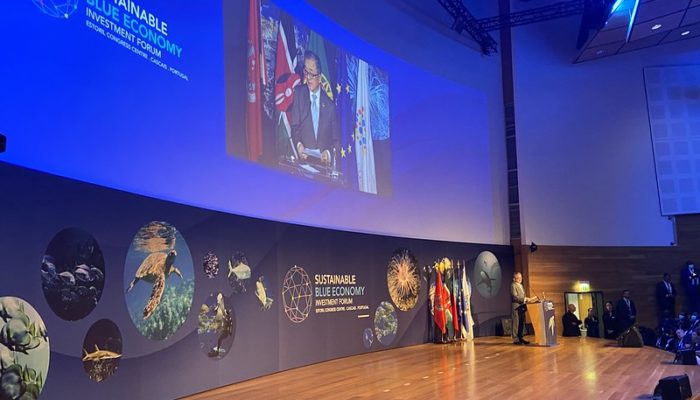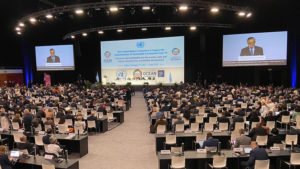
“The ocean is not too big to fail, nor is it too big to fix, but it is too important to ignore.”
Last week, Dr Jane Lubchenco voiced a thought we’ve all had at some point: that the ocean is so vast and bountiful, it is almost inconceivable that people could impact it. And yet…
Speaking to more than 20 Heads of State and Government, and an audience of thousands of policymakers, ocean scientists, business leaders, and non-government organizations at the United Nations Ocean Conference 2022, the Deputy Director for Climate and Environment at the White House left no room for doubt about the ocean’s central role to our future.
The conference was held last week in Lisbon, Portugal, from 27 June – 1 July 2022, and put the spotlight on innovative and science-driven solutions to reverse ocean decline. Co-hosted by the Governments of Kenya and Portugal, the event brought together delegates from 130+ countries to measure international progress in meeting the Sustainable Development Goal 14: Life Below Water. They signed the Lisbon Declaration and pledged over a billion US dollars towards ocean conservation.
This blog highlights some of the main takeaways from the week-long conference.
50 pledges and billion-dollar investments
Today, Sustainable Development Goal 14 remains the most underfinanced of the 17 Global Goals, and access to existing finance continues to pose a major barrier. Understandably, financial support was high up on the conference agenda to address the ambitious (and now urgent) goals for ocean protection. The conference concluded with a total of 50 high-level pledges, including an investment of €9.82 million (USD 1 billion) to support the creation, expansion, and management of Marine Protected Areas, and Indigenous and locally governed marine and coastal areas by 2030.
Some of the key pledges made during the week-long conference include:
- €1.1 billion (USD 1.2 billion) by the Development Bank of Latin America (CAF) in support of ocean projects in the region
- €1.1 billion (USD 1.2 billion) by Australia to preserve and restore the Great Barrier Reef
- €4.9 million (USD 5 million) annually by Namibia towards research, control, monitoring, and surveillance in marine ecosystems
- €392,870 (USD 400,000) in 2022 by Sweden to support enhanced scientific cooperation in the UN Decade on Ocean Science
- €150 million (USD ~152 million) as an additional extension by the European Investment Bank across the Caribbean region as part of the Clean Oceans Initiative
- €147 million (USD 150 million) by a broad coalition of philanthropic, government, and non-government organizations to support Colombia, Costa Rica, Ecuador, and Panama in strengthening the Eastern Tropical Marine Corridor (CMAR)

Liu Zhenmin, Under-Secretary-General for the UN Department of Economic and Social Affairs addresses the opening of UN Ocean Conference. Photo credit: UN DESA / Helen Daun Rosengren
Partnerships to protect blue carbon ecosystems
Blue carbon refers to carbon stored in coastal and marine ecosystems, which can trap as much climate-warming carbon as the annual emissions of 90,000 cars! However, this special ecosystem has largely been ignored as a potential solution to the climate crisis, but now this may soon change. The UK government announced a partnership with the University of St Andrews, the Scottish Government and Conservation International to boost research on blue carbon ecosystems and how to protect them.
“The fact that blue carbon is front and center at the ocean conference in Lisbon is evidence that it’s being recognized as a powerful climate solution,” said Emily Pidgeon, Vice President of ocean science at Conservation International.
“Now, countries must take concrete actions to protect these ecosystems — there isn’t a minute to waste.” she added.
An alliance to halt deep-sea mining
A growing number of policymakers and scientists urge against mining the deep sea, at least not until we fully understand the consequences. At this year’s UN Ocean Conference, Surangel Whipps Jr., President of the Pacific Island nation of Palau, announced his nation’s plans to launch an alliance of countries pushing for a halt or delay on deep-sea mining. Deep-sea mining, he explained, can compromise the integrity of the ocean habitat that supports marine biodiversity and contributes to mitigating the impact of climate change.
Marine biologist and oceanographer Sylvia Earle unreservedly agreed, saying,
“The greatest discovery perhaps of the 20th century about the ocean was discovering the magnitude of our ignorance.”
Following the news of the alliance, the Pacific Island nations of Fiji and Samoa announced they would join the coalition. Tuvalu and Guam also expressed their support, although they are yet to formally join the alliance.
Concerted effort to address other pollutants
Steffi Lemke, Minister for the Environment, Nature Conservation, Nuclear Safety and Consumer Protection of Germany, expressed concern about the “overheated, acidified, overfished, overused and polluted” state of the ocean. She highlighted the plan of the Group of Seven (G7) to address plastic pollution now, rather than waiting for an international convention.
Similarly, Jitendra Singh, Minister for Earth Sciences of India, outlined the country’s plans to ban single-use plastics. Efforts are already under way to phase out plastic and polyethylene bags and promote alternatives, such as bags made from cotton or jute. He also reiterated India’s commitment to reduce one billion tonne of CO2 emissions through the addition of 500 gigawatts of renewable energy generators.
Kay Rala Xanana Gusmão, Minister for Planning and Strategic Investment of Timor-Leste informed participants of his government’s recent success in delimiting permanent maritime boundaries with Australia and is now working with Indonesia to achieve the same.
Decision making that involves local communities
An interesting point raised during the conference was the role of local communities and people who are otherwise excluded from major decision making. The representative of the International Science Council said
“the international community must break free from top-down, hierarchical systems of knowledge to enable the co-creation of ocean knowledge.”
Other speakers chimed in agreement, including the representative of Blue Ventures, who said fisher folk are the best scientists of the ocean but are rarely represented in decision-making. “There is nothing small about small-scale fishers,” he stressed, because they have the global reach and knowledge to reshape humanity’s relationship with the ocean.
As is the case with most multi-governmental conferences, it remains to be seen how much of what’s been pledged will convert into rapid action. United Nations Secretary-General António Guterres informed delegates that “we have taken the ocean for granted, and today we face an Ocean Emergency.” On the bright side, he added that several interventions and efforts are already being introduced, including a new treaty to address the global plastics crisis that is choking our oceans, and a World Trade Organization agreement to end harmful fishery subsidies.
Click here for more information and resources on the UN Ocean Conference.




